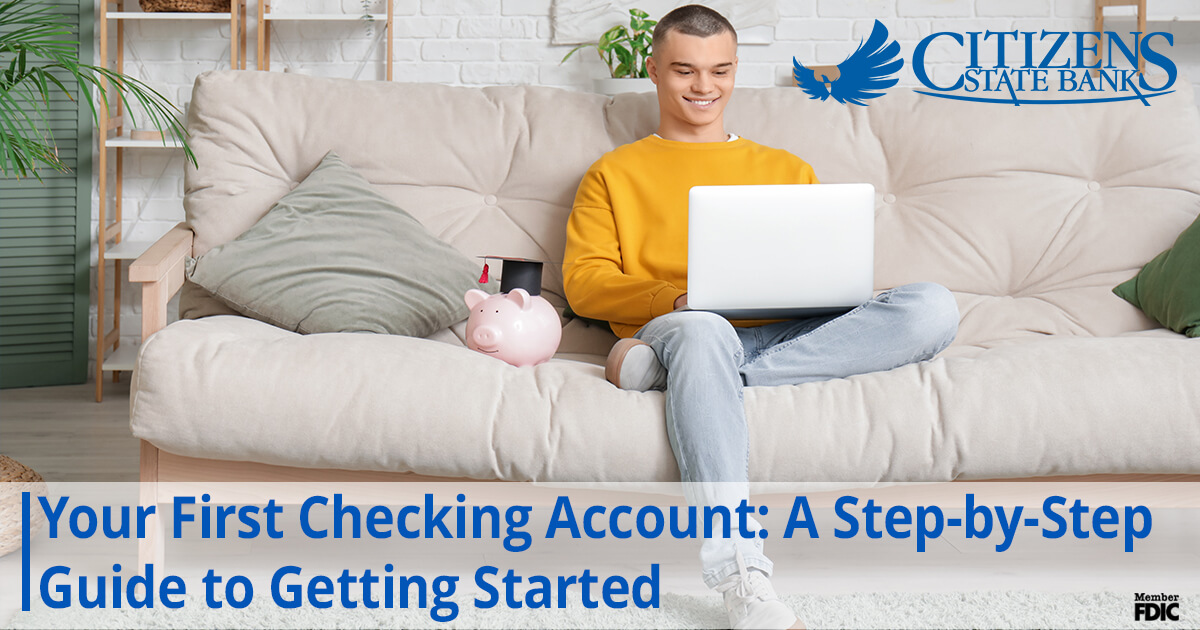Whether you're off to college, starting a new job, or ready to take charge of your own financial future, opening your first checking account marks an important achievement. A checking account is a safe and convenient way to handle day-to-day financial transactions. Here's a guide to help you through the process.
Why Open a Checking Account?
A checking account offers:
- Convenience: You can deposit paychecks, pay bills, write checks, use a debit card or transfer money online—so many ways to access your money!
- Security: Funds are insured up to $250,000 by the FDIC, protecting your money from loss or theft
- Financial Management: With the help of online and mobile banking tools, you can track all your spending, set up budgets and monitor expenses
Choosing the Right Account
When selecting a checking account, here are some guidelines:
- Fees: Look for accounts with no monthly maintenance fees or minimum balance requirements
- Accessibility: Make sure the bank offers a wide range of services like account choices, robust digital banking options, along with convenient office and ATM locations
- Features: Look for perks like overdraft protection, mobile check deposit, and referral or rewards programs Some accounts offer perks like overdraft protection, mobile check deposit, and rewards programs
Tip: Compare different options to find the account that best fits your specific needs.
What You'll Need to Open an Account
To open a checking account, you'll typically need:
- Identification: A government-issued photo ID, such as a driver's license or passport
- Social Security Number: For identity verification and tax purposes
- Proof of Address: A utility bill or lease agreement showing your current residence
- Initial Deposit: Some banks require a minimum deposit, often ranging from $25 to $100
Note: If you're under 18, you may need a parent or guardian to co-sign the account.
Opening Your Account
You can open a checking account:
- Online: Many banks offer online account-opening, allowing you to open your account anywhere, anytime
- In-Person: Visit a local office to open an account with the help of a personal banker
Remember to review the account terms and conditions carefully before signing.
After your account is open:
- Set Up Direct Deposit: Have your paycheck deposited directly into your account for quick and secure access to funds
- Enroll in Digital Banking: Monitor your account balance, pay bills, and transfer funds online or through a mobile app
- Use Your Debit Card Wisely: Keep track of your spending to avoid overdraft fees
- Stay Informed: Regularly review your transactions and set up alerts to monitor your activity
Ready to Open Your First Checking Account?
At Citizens State Bank, we offer a variety of checking accounts designed to meet our clients’ unique needs. Most of our accounts include*:
- No monthly maintenance fees
- Free digital banking tools like debit card controls, account alerts, financial insights, and more
- Instant-issue Visa debit card
- Tell-A-Friend rewards
- A free thank you gift
- “Buy back” program
- A Personal Banker to help you find what’s right for you
Visit mycsbin.com to learn more or open your account today. Embark on your financial journey with confidence and the support of a trusted banking partner.
*Minimum opening deposit is only $50. Ask us for details. Bank rules and regulations apply. Other fees such as non-sufficient funds, overdraft, sustained overdraft fees, etc. may apply. See fee schedule for details. Free gift may be reported on a 1099-INT or 1099-MISC. Free gift provided at the time of account opening. $10 for checks and debit cards from another financial institution given at the time the checks/debit cards are presented. Offer subject to change without notice.
The views, information, or opinions expressed in this article are solely those of the author and do not necessarily represent the views of Citizens State Bank and its affiliates, and Citizens State Bank is not responsible for and does not verify the accuracy of any information contained in this article or items hyperlinked within. This is for informational purposes and is no way intended to provide legal advice.
